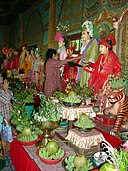Ponmagyi
Ponmagyi (Burmese: ပုန်းမကြည် or ပုန်းမကြီး; also spelt Pone Ma Gyi), also known as Ponmagyi Shinma (ပုန်းမကြည်ရှင်မ) is a Burmese rice and fertility nat (spirit) traditionally worshipped by farmers in Upper Myanmar.[1]
Origins[edit]
Ponmagyi originates from fertility cult practices throughout Southeast Asia.[2] Similar rice goddesses and tutelary spirits, including Phosop in modern-day Thailand, and Dewi Sri in modern-day Indonesia, exist throughout the region.
Devotional rituals[edit]
Worship of Ponmagyi is commonplace throughout rural Upper Myanmar, especially in the dry zone regions around Bagan and Magwe.[3] Ponmagyi is worshipped during the first to eighth days of the traditional Burmese month of Tabaung, as farmers begin their land preparation for the year.[3]
Her devotees include farmers, agriculturalists, and others that work in the rice industry, to ensure stable and predictable weather and bountiful harvests of crops such as paddy, beans and pulses, and sesame seeds, during the annual planting season.[1] Devotees traditionally offer cooked rice, laphet (tea leaves) and rice flour snacks called mont hsi gyaw (မုန့်ဆီကြော်).[1]
References[edit]
- ^ a b c "မြန်မာတို့ရဲ့နာမည်ကျော် နတ်များ". The Myanmar Times. 2019-09-26. Retrieved 2020-03-05.
- ^ Moore, Elizabeth H. (2007). Early Landscapes of Myanmar. River Books. ISBN 978-974-9863-31-2.
- ^ a b Ando, Kazuo (2020). "Harrow (tun) farming in Bagan" (PDF). SEAMEO REgional Centre for History and Tradition.

